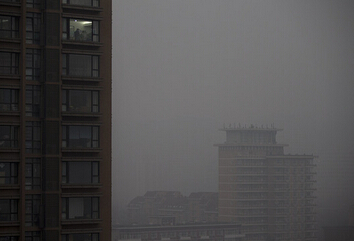(单词翻译:单击)
在北京灰蒙蒙的天空已经“闻名遐迩”之际,该城市似乎每周都要推出一项减少空气污染的新措施。
Last week, local authorities said they wanted to build wind tunnels to funnel wind through the streets and blow away the bad air. This week, the state-run People's Daily reported plans to spend $7.7 billion in the next five years to reduce air pollution. That spending will go toward measures that reduce air pollution from coal-fired power plants, vehicles, and industrial facilities. Such measures include building waste-gas treatment facilities, installing emissions-reduction technology at factories and power plants and using cleaner alternative fuels, it said.
当地有关部门上周称,他们想建立风道,引导风从大街小巷通过并吹散雾霾。官方媒体《人民日报》本周则报道称,北京市计划5年内斥资77亿美元以减少大气污染;这些资金将用于燃煤、机动车排放、工业等方面的污染防治措施,具体包括建设废气处理设施、对工厂和电厂进行低排放术改造和采用清洁燃料替代燃煤。

It's an uphill battle, with some scientists concluding that China's air quality is continuing to get worse despite such efforts. Environmental authorities recently said Beijing's air quality won't drop to healthy levels until 2030. Other cities across the country face similar challenges.
这是一场苦战,一些科学家得出结论称,尽管采取了这类措施,但中国的空气质量将继续恶化。环保部门最近称,北京的空气质量达标要等到2030年。中国其他城市也面临着类似的挑战。
That's grim news. But if you can't avoid the air pollution, at least you can try and avoid the times when it's at its worst. Last week, China Real Time did the math to figure out the best months for air quality in Beijing and Shanghai. This week, we've crunched more numbers to determine the worst (and best) hours for residents to be outdoors in both cities.
这是个不幸的消息。但如果你无法避免空气污染,至少你可以尝试躲开污染最严重的时期。上周,《中国实时报》栏目(China Real Time)算出了北京和上海空气质量最佳的月份。本周,我们调用了更多数据,确定了两个城市居民户外活动的最糟(以及最好)的时段。
The results show that Beijing's air improves during the day, but gets worse at night. In Beijing, air quality is at its best between noon and 4 p.m., when the average concentration of PM2.5 -- particles measuring less than 2.5 microns in length -- falls to around 87 micrograms per cubic meter. By contrast, between 7 p.m. and 3 a.m., PM2.5 levels rise to as high as 113 micrograms per cubic meter.
计算结果显示,北京的空气质量在白天会好转,晚上会恶化。在北京,空气质量最好的时间是中午到下午4点,平均PM2.5(直径小于2.5微米的颗粒物)浓度降至每立方米87微克。与之相比的是,下午7点到凌晨3点,PM2.5水平升至每立方米113微克之高。
Shanghai's air gets worse after rush hour. The city's air is cleanest during the early morning and late afternoon, when PM2.5 levels fall to 53 micrograms per cubic meter or lower. After the morning and evening rush hour, PM2.5 levels rise to as high as 59 micrograms per cubic meter.
上海空气质量在交通高峰期过后会下降。这个城市的空气是在大早上和临近傍晚最干净,PM2.5水平降至不超过每立方53微克。在早晚高峰过后,PM2.5水平会升至每立方米59微克。
Why does Beijing's air quality get worse at night? Antony Chen, an associate research professor at the Desert Research Institute in Nevada, notes that Beijing's air quality is mainly influenced by the difference in temperature between night and day.
北京的空气质量为什么会在夜间变差?内华达州沙漠研究所(Desert Research Institute)的副教授Antony Chen指出,北京的空气质量主要受到昼夜温差的影响。
Mr. Chen says PM2.5 gets trapped in the cooler air near the surface in the evenings, which accounts for the higher concentrations at night. When the sun comes out, the air heats up and rises, which leads to lower concentrations in the day, he says.
Chen说,傍晚的时候,接近地表的空气温度较低,PM2.5在这样的空气里无法扩散,这就是为什么在夜里PM2.5的浓度会更高。他说,等到太阳一出来,空气温度上升后上行,所以白天PM2.5的浓度较低。
'The warm layer of air wants to go up, and the cold air wants to go down, and there basically becomes circulation, movement and turbulence,' Mr. Chen says.
Chen说,暖空气会往上走,冷空气会向下走,由此形成对流、空气运动和湍流。
By contrast, Shanghai's temperature is more constant, thanks to its proximity to the ocean, says Mr. Chen. With fewer temperature swings during the day, he says, Shanghai's air pollution patterns are more impacted by factors such as vehicle emissions.
Chen说,相比之下,上海的昼夜温差因为近海的缘故变化较小。他说,由于白天上海的温度变化更小,所以当地空气污染模式受机动车尾气排放等因素的影响更大。
Based on data from the U.S. State Department, the average PM2.5 concentration over a 24-hour period is about 99 micrograms per cubic meter in Beijing and 56 micrograms per cubic meter in Shanghai. That means Shanghai's air is on average about 40% better than Beijing's. (The U.S. State Department cautions that such data is not complete, as the readings come from a single monitoring station that was installed in Beijing in 2008 and in Shanghai in 2011.)
根据美国国务院的数据,北京24小时PM2.5平均浓度大约为每立方米99微克,上海是56微克。这表明上海的空气质量平均而言比北京好40%。(美国国务院称,上述数据并不全面,因为数据只来自2008年在北京设立、2011年在上海设立的单一监测站。)
But no matter the time of day, neither city has anything approaching clean air. Air quality in both Beijing and Shanghai falls far short of the U.S. Environmental Protection Agency's recommended PM2.5 limit of 35 micrograms per cubic meter for a 24-hour period. High concentrations of PM2.5 increases risks for cardiovascular and respiratory diseases, as well as lung cancer, according to the World Health Organization.
但无论是一天中的哪个时段,这两个城市的空气都算不上干净。美国国家环境保护局(Environmental Protection Agency)建议的24小时PM2.5均值上限为每立方米35微克,北京和上海的空气质量都差得远。根据世界卫生组织(World Health Organization)的说法,高浓度PM2.5会增加罹患心血管、呼吸系统疾病以及肺癌的风险。


